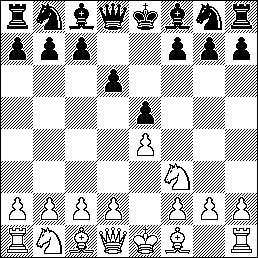Philidor
| Morphy | Tarrasch
| Lasker | Pillsbury
| Rubinstein | Niemzowitsch
| Capablanca | Reti
| Alekhine | Najdorf
| Reshevsky | Khan
. . . . . . . . . . . . . . . . . . . . . . . .
Francois-Andre Danican Philidor (1726-1795)
"Pawns are the soul of chess."-Philidor
 Although Philidor was the greatest chess player of his time, he professed
to be just a musical composer (of which he was great in his day), because
chess was not fully understood by the masses.
Although Philidor was the greatest chess player of his time, he professed
to be just a musical composer (of which he was great in his day), because
chess was not fully understood by the masses.
He was the first great blindfold chess player, playing three opponents while blindfolded. He did this three times. In the 18th century, this almost amounted to witchcraft. He was the first to understand the value of playing the pawns correctly and hence wrote the first real strategy book on chess. He invented the Philidor's Defense:

His musical skills were of the highest order. In his career, he composed more than 20 operas. At the age of six, he became a member of the Chapel-Royal choir in Versailles. This is where he learned chess, as musicians in those days were very knowledgeable in chess, or at least, more than the average person. He learned by watching others play. There were other great players that learned chess this way: Morphy, Capablanca, Karpov, etc.
At the age of 11, his first musical composition was played before King Louis XV. That is definitely big time stuff. When he was 14, his voice changed, and he had to leave the Chapel-Royal choir.
At 15, he was tutored in chess by France's greatest chess player of the day, Sire de Legal. Three years later, he quit instructing Philidor, because he became stronger than he was. At 18, Philidor had become the strongest chess player in the world, with no one to tutor him anymore.
At this time (1744), Philidor played two chess games blindfolded simultaneously in public in Paris. He said he learned how to do this when he could not sleep at night and played chess without sight of a chessboard. This was the first time blindfold play against two opponents was ever recorded.
Philidor became quite famous with his chess abilities at this time. He played chess against Voltaire and Rousseau. And, of course, he creamed them.
At the age of 19, Philidor went to Rotterdam, Holland to present his musical compositions. But the concerts were cancelled and he was stranded in Holland with no money. He then supported himself by teaching and playing chess and Polish checkers, especially to English army officers at The Hague.
At the age of 21, he travelled to London, England and beat the two best English chess players of the day, Stamma and Sir Janssen, at Slaughter's coffee house.
Philidor was at the top of the world at this point. Phillip Stamma was the best English player, and Philidor challenged him to a ten-game match with an extraordinary set of rules. Philidor insisted that Stamma play White in all of the games, and that any draw would count as a win for Stamma. This is either cocky or stupid. Nevertheless, Stamma accepted the terms (who wouldn't?) and Philidor won 8 games and lost 2, one of the losses being a drawn game. He also beat Sir Janssen 4 wins and 1 loss.
At 22, Philidor wrote L'analyze des Eschecs (Analysis of Chess). Some of the early subscriptions were: Lord Sandwich (10 copies), Duke of Cumberland (50 copies), English army officers (119 copies). This made Philidor and the publishers quite wealthy.
At 23, 433 copies of his book were published in London, England. It was the first chess book translated into Russian, and was one of the favorite books of Thomas Jefferson. This was the first chess book that organized the chess openings.
He was invited to the courts of Europe to play chess in front of the royalties. He played in King Frederick's castle at Potsdam. He played for the Duke of Mirepoix. In 1755, he beat the great Legal in a match at the Café del la Regence in Paris, France.
He spent the next 40 years of his life intermixing chess and composing music. In 1795, at the age of 68, he died in London, England. The newspaper obituary read, "On Monday last, Mr. Philidor, the celebrated chess player, made his last move, into the other world".
-----Terry Crandall
. . . . . . . . . . . . . . . . . . . . . . . .
Philidor | Morphy | Tarrasch | Lasker | Pillsbury | Rubinstein | Niemzowitsch | Capablanca | Reti | Alekhine | Najdorf | Reshevsky | Khan